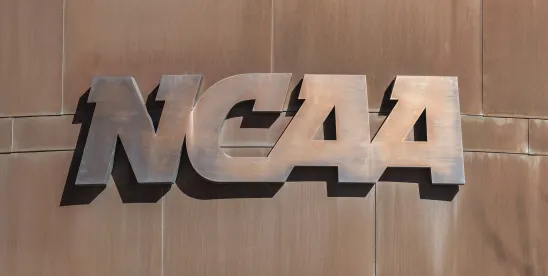The NCAA has announced “a new era” in college sports, touting “unprecedented” benefits for student-athletes following the U.S. District Court for the Northern District of California’s long-awaited approval of the $2.8 billion settlement in the House antitrust lawsuit against the NCAA and the “Power 5” conferences – the ACC, Big Ten, Big 12, Pac-12, and SEC that ends a bar on direct compensation to student-athletes.
Beginning July 1, 2025, institutions competing at the Division I level may provide direct compensation and benefits to student-athletes, subject to an initial cap of approximately $20.5 million and increasing annually based on revenue sharing across the Power 5 conferences. In addition:
- Scholarship limits will be replaced with sport-specific roster limits. Student-athletes rostered or recruited this past academic year have some protections for their roster spots for the length of their eligibility.
- Institutions have new reporting requirements. In the next month, institutions must submit a list of all student-athletes eligible for roster protection. Student-athletes must report all third-party name, image, and likeness (NIL) agreements valued over $600. After each academic year, each institution must report those student-athlete third-party NIL agreements as well as all NIL agreements and other benefits the institution provided directly to student-athletes and their families.
Rules and procedures for enforcement of these new terms are still developing. However, the NCAA will not be the enforcement body. The Power 5 conferences have established a new College Sports Commission for enforcement of the House settlement terms. Disputes over enforcement – such as student-athlete eligibility and institutional violations – are subject to mandatory expedited arbitration, before designated arbitrators, with binding resolutions within 45 days.
This April, in anticipation of the court accepting these terms, the NCAA’s Division I Board of Governors adopted changes that eliminated more than 150 rules from the Division I 2024/25 Manual. The NCAA will still enforce rules not impacted by the House settlement.
The House settlement provides clear parameters for student-athlete compensation in many ways, but questions still remain. Institutions should expect legal challenges on a number of related issues, including how Title IX will apply to student-athlete compensation, whether student-athletes are employees of their institutions, and limits on student-athlete eligibility, among others.





 />i
/>i

